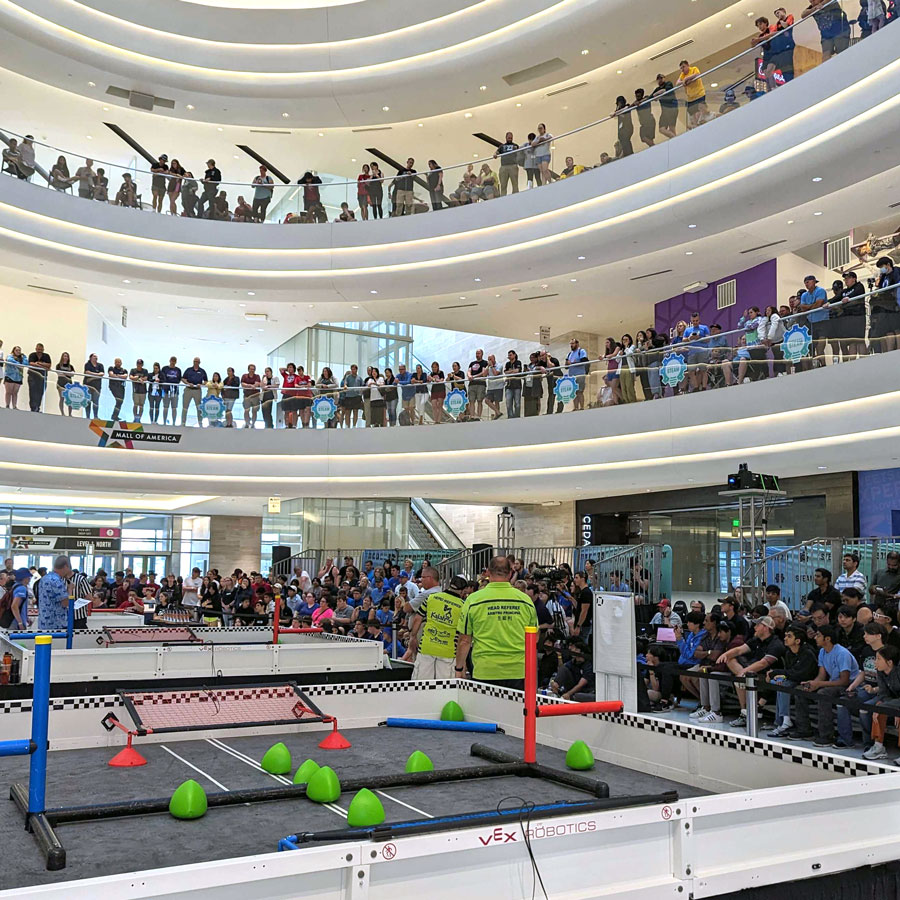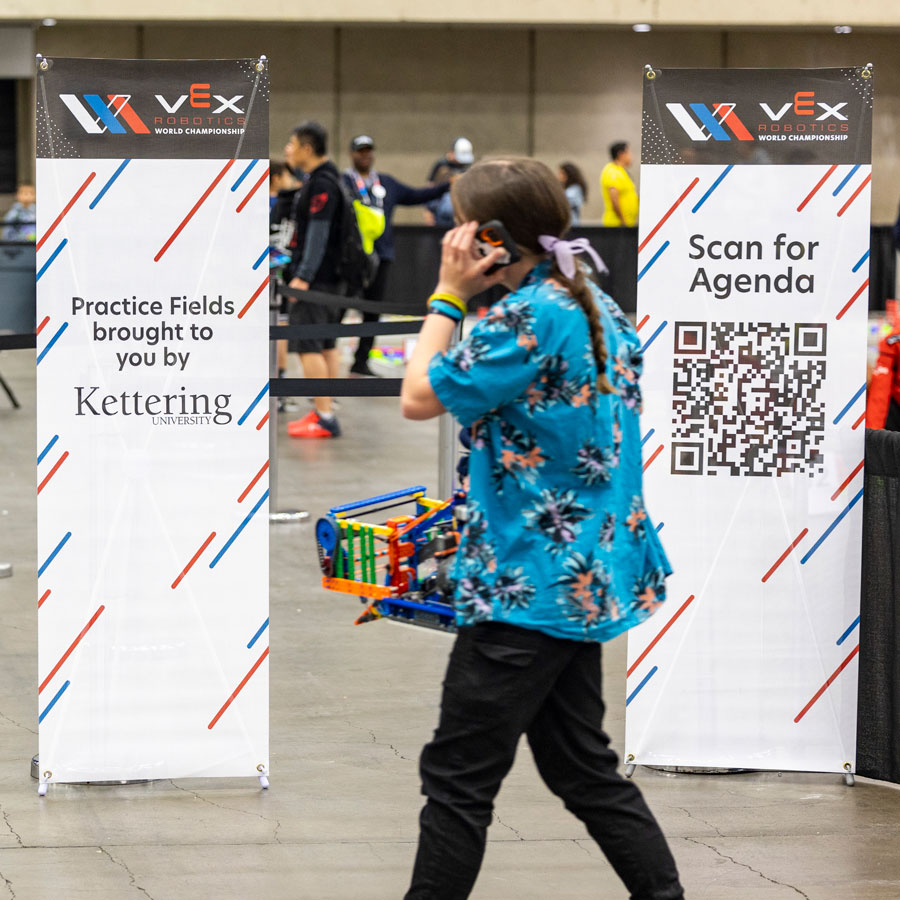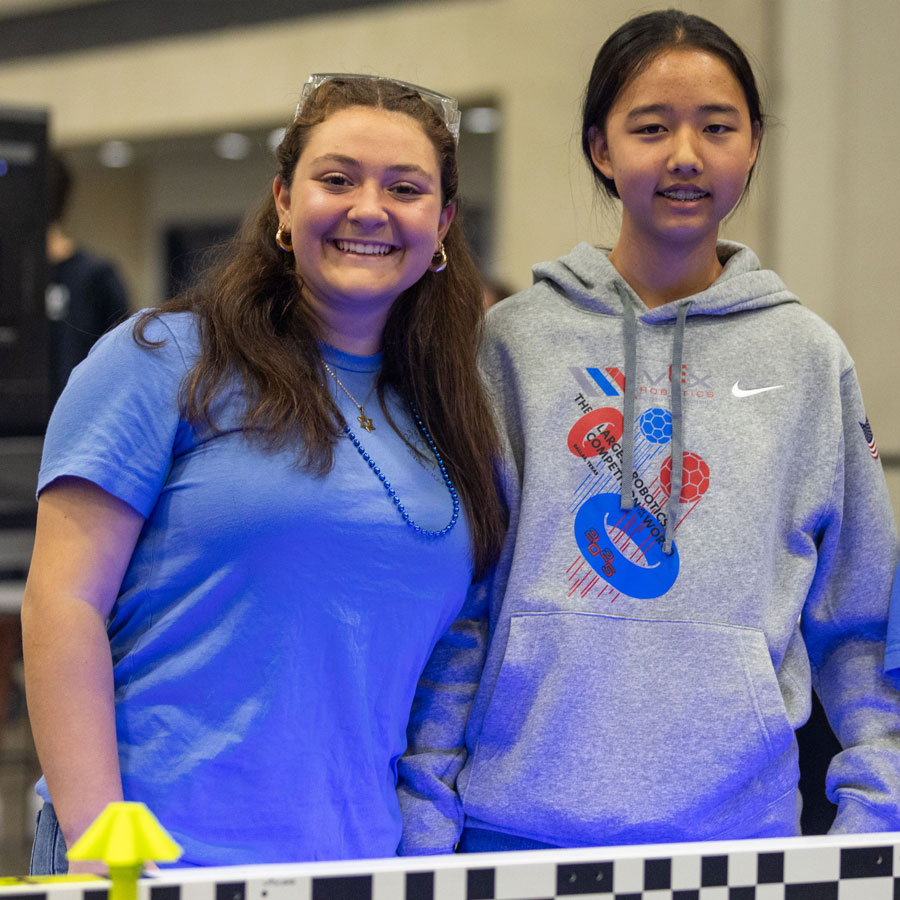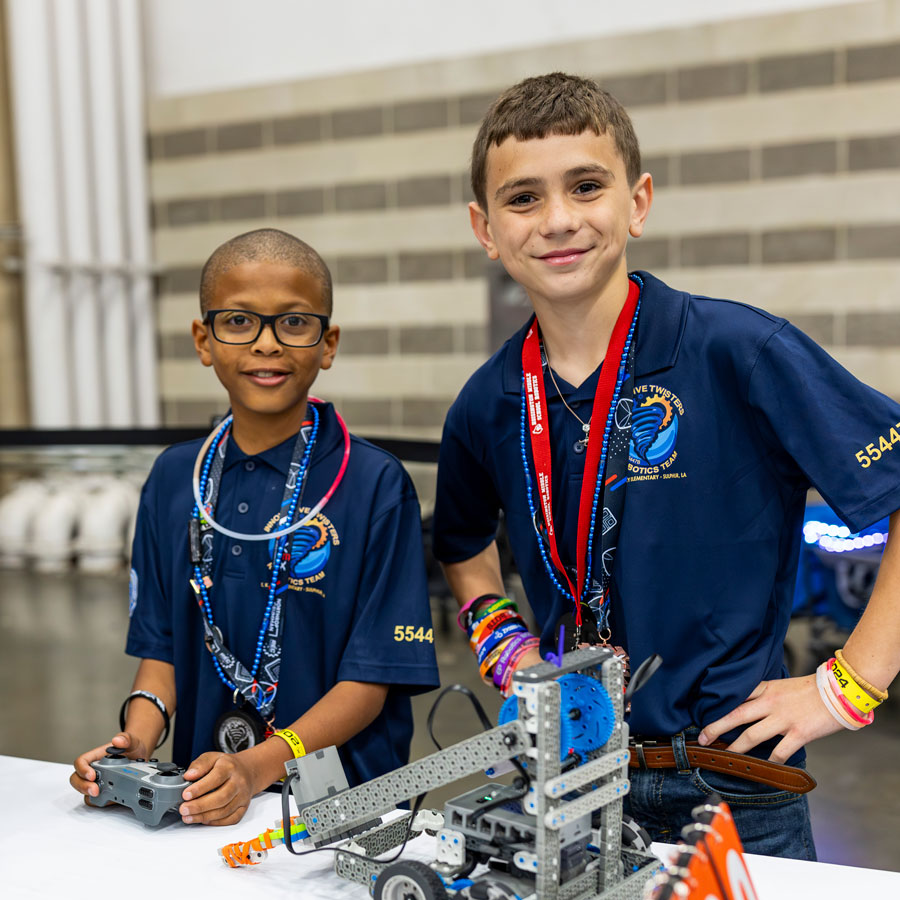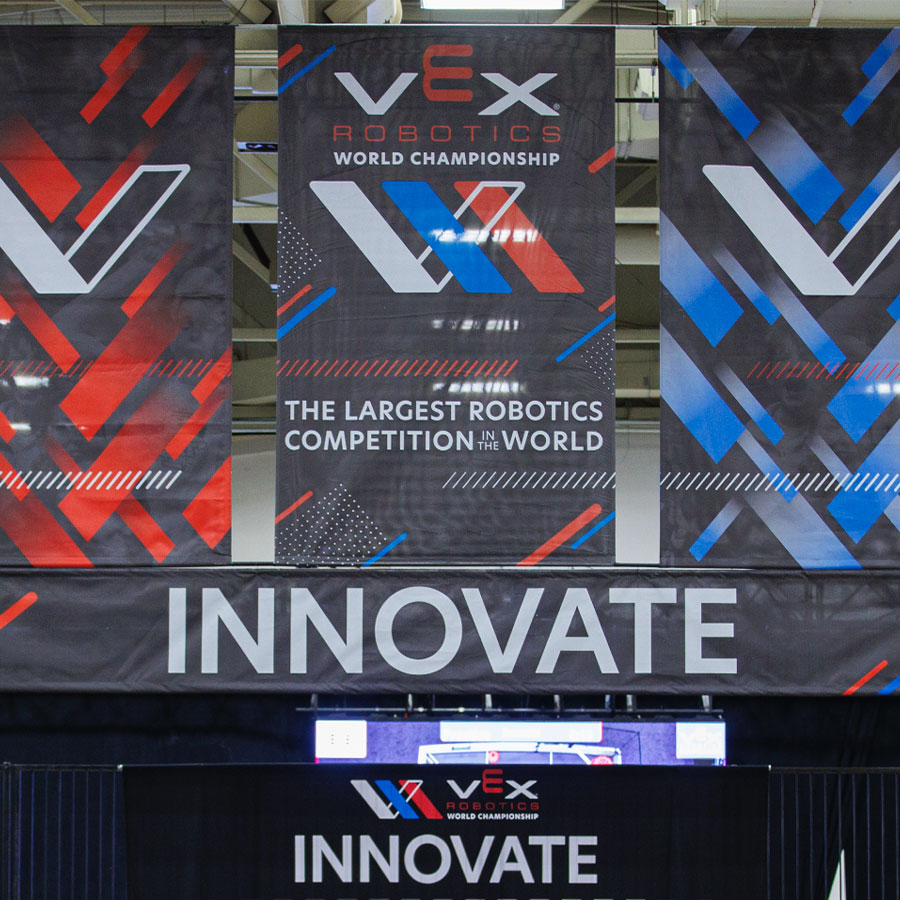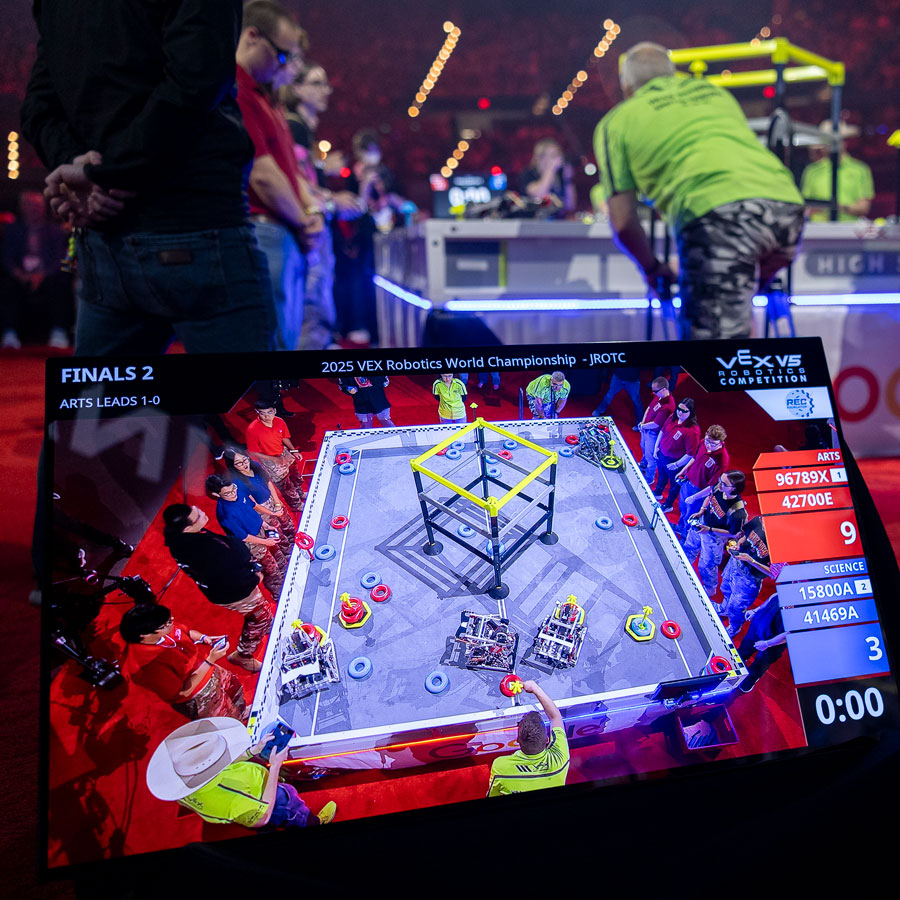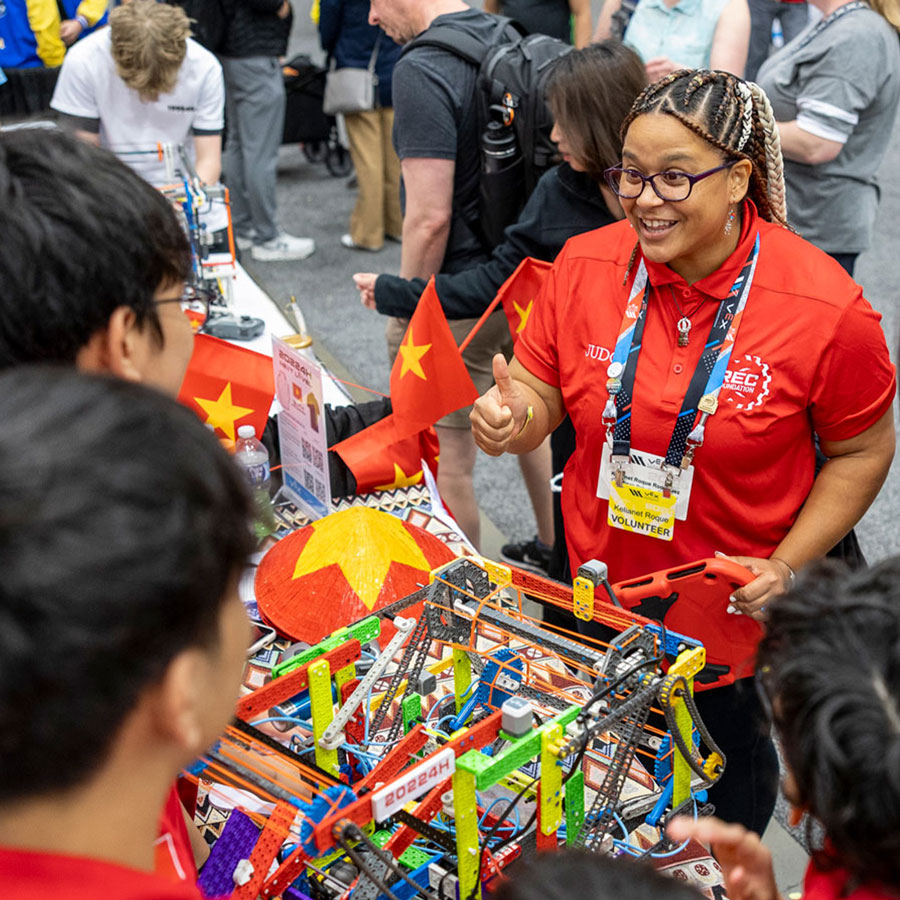

Lisa Schultz is the Director of Regional Operations at the Robotics Education & Competition (REC) Foundation. She applies her previous career experiences as a mechanical engineer and high school science and robotics teacher to provide educators and students with opportunities to develop their STEM skills through competitive robotics. Her passion is providing pathways and reducing roadblocks for young women to explore STEM careers. Lisa received her Bachelor’s degree in mechanical engineering from the University of California, Davis, a Master’s degree in teaching from the University of Maine, and recently completed a Master’s degree in Computer Science at City University of Seattle.
Thank you so much for doing this with us! Can you tell us a story about what brought you to this specific career path?
I began my career as a mechanical engineer in California and then transitioned into teaching high school science and robotics in rural Maine. My robotics class was of my favorite classes to teach because the open-ended learning experience engaged students in learning by providing fun opportunities to test their ideas and persevere. I also coached the high school robotics team and the experience inspired me because of how it challenged students and grew their personal and technical skills. I relocated to Seattle in 2016, and I joined the REC Foundation as a Regional Support Manager for the Pacific Northwest. I thought this position would be a great opportunity to apply my engineering and educational background to support other educators looking to integrate competitive robotics in their organization. After three years, I joined the leadership team as the first female Director of Regional Operations and have enjoyed contributing to the direction of the REC Foundation.
Can you share the most interesting story that happened to you since you began at your company?
I was invited to be on the VEX Game Design Committee about a year after starting with the REC Foundation. This committee designs the VEX robotics competitions that are released each year and these games are integral to the educational robotics programs. I had several years of experience as a robotics coach where I would work with students to strategize about the games, and this new opportunity gave me the “behind-the-curtain” experience to see how these games are created. The group of people on this committee come from a variety of backgrounds and this experience has given me incredible insight on how to effectively work as a team to accomplish an extremely difficult task in a short period of time. Each year the new game is released the last day of the VEX Robotics World Championship, and my favorite moment was when I was on the arena floor during the game announcement surrounded by thousands of anxious students waiting to hear what the new game would be. The look of excitement and joy on their faces once the game was announced was surreal and nerve-wracking! Even though we think the game is going to be fun for students, there’s always a worry that they won’t like it. This experience has been one of the most challenging but rewarding aspects of my position, and each year I’m continually impressed by how the students take different approaches to play the game.
Can you share a story about the funniest mistake you made when you were first starting? Can you tell us what lesson you learned from that?
About four months after starting with the REC Foundation, I was managing a division at the VEX Robotics World Championship. This was my first time at VEX Worlds and part of that role is ensuring the volunteers have everything they needed. The emcee for that division shared that his throat was getting sore and asked if I would fill up his water bottle with hot water so that he could make some tea to soothe this throat. I was happy to help and quickly filled his new water bottle that he received for being a volunteer. Later that afternoon, the Emcee came over with a big smile and shared that he was thankful for my help, and then shared that the new water bottles had a paper insert and I had forgotten to take it out before I filled up the bottle. We had a great laugh about it at the time, and then a few years later we ended up hiring him. As we were trying to figure out when we first met, I suddenly remembered the water bottle incident. We still laugh at this memory and it’s a great lesson in not sweating the small stuff.
What do you think makes your company stand out? Can you share a story?
The REC Foundation is committed to providing engaging and accessible opportunities for students to explore and develop their STEM skills through competitive robotics. COVID-19 is affecting the typical learning environments with many students only meeting remotely. I’m very proud of our company for listening to the needs of teachers and students during this challenging time and providing remote opportunities for students to participate. Normally teams would need to attend an in-person event, but this year, students can connect over video to compete. One of the silver-linings of this season is that we will continue to offer a remote competition experience after this season with the goal of increasing the accessibility for rural schools.
Are you working on any exciting new projects now? How do you think that will help people?
I am on our Girl Powered program team and our mission is to re-define the face of STEM by providing opportunities for young women. The Girl Powered initiatives focus on addressing the barriers young women face with the goal of increasing their confidence and awareness in STEM fields. My favorite opportunity is our Girl Powered Workshops where young women are invited to Google campuses for a multi-day robotics training. assisted with the workshops at the Seattle Google campus and it was an amazing experience to see young women go from never building a robot before to driving their robot in their first-ever robotics match in just two days. These opportunities are critical to providing a safe and nurturing environment where girls are supported and feel they can succeed.
Ok super. Thank you for all that. Let’s now shift to the main focus of our interview. Are you currently satisfied with the status quo regarding women in STEM? What specific changes do you think are needed to change the status quo?
There have been improvements in this area, but I still see a lack of women in STEM careers and leadership positions. The focus of change needs to start early to build confidence and problem-solving skills. We tend to compartmentalize STEM in education when STEM can be incorporated in all that we do. By integrating more STEM activities at an early age, we can build confidence in girls and reduce the stigma that STEM requires a special talent rather than skills that can be learned.
I also think more research is needed to identify the roadblocks that contribute to the lack of women entering STEM fields. Many people know this is a problem, but it’s difficult to know what initiatives result in change. I’m a data person and prefer to support initiatives that have been well researched rather than based on anecdotal experiences.
In your opinion, what are the biggest challenges faced by women in STEM or Tech that aren’t typically faced by their male counterparts? What would you suggest to address this?
Women still need to prove themselves more than males to get access to the same opportunities. One particularly frustrating experience for me was when I became the first-ever robotics coach at the high school and needed access to the shop next to my classroom during the competition season. I was told that I would need to get an Industrial Arts certification before I could be allowed to have the access with students even though I had machine shop training and experience. I decided to jump though that hoop and luckily, I only needed to take one online course (ironically unrelated to shop safety) and pass the Industrial Arts certification test over the summer. When I left the school, I heard the school district gave access to the male replacement without this same requirement. It’s difficult to share this story and I appreciate all that the high school did to support me while I was there, but I think it’s important to shed light on these types of situations so they can be addressed.
I have mitigated this challenge in my career by learning how to demonstrate my abilities and earning the respect of my peers, but this issue is prevalent and needs to be addressed on a larger scale. Companies should review their hiring practices and address unconscious gender bias by removing names from resumes to focus on the person’s prior experience and skills. Another tactic is to reflect on our own reactions and behaviors to examine if we would respond the same way if the person was a different gender. This activity can be extremely insightful in identifying the assumptions and differences that our culture has ingrained in all of us.
What are the “myths” that you would like to dispel about being a woman in STEM or Tech. Can you explain what you mean?
A common myth is that women are not interested in STEM careers and that is why we see more men entering these fields. I don’t think all people want to enter STEM fields, but we don’t provide the same opportunities and support to young girls compared to young boys that lead to considering these opportunities. We need to expand how we capture the interest of underrepresented groups by matching the opportunities to the interests of students. Let’s figure out what young girls are interested in and connect STEM learning to those activities rather than trying to fit them into the mold of what we think they should be interested in. Women are curious and intelligent individuals that have a passion for improving the world. By showing how their interests align with STEM fields, we can reveal additional pathways that they may not have known existed.
What are your “5 Leadership Lessons I Learned From My Experience as a Woman in STEM or Tech” and why? (Please share a story or example for each.)
1. Know your strengths and weaknesses.
I am a hard-core introvert and have been my entire life. As an introvert, I am an observer and enjoy studying how people respond. This has helped me approach problems by considering different viewpoints in detail. There are instances where being an introvert has its challenges, though. I feel uncomfortable in large social situations and would rather let others be in the spotlight. I have learned to use being an introvert to provide valuable insights and how to go outside my comfort zone, when needed.
2. Never stop learning.
I love learning and I’m excited to live in a time where knowledge is available at your fingertips. I think this is one of the main reasons I have been successful because I want to learn every detail of my position, and if I don’t understand how something works, then I am determined to figure it out. This trait has helped me gain the confidence and respect of those I work with and I believe good leaders have a deep understanding of all aspects of the organization.
3. Take time to think.
This is a tough one to apply in our fast-paced work environment, but it can be extremely valuable to take time to carefully consider a problem rather than making an impulsive decision. My best ideas usually come to me when I’m on a walk by myself without any distractions. As my responsibilities have increased, I’ve needed to be more intentional about taking breaks. This practice has helped me to take a step back and identify the core issues of a problem, which can get difficult to see when you are right in the middle of a situation. We need to dispel the myth that you need to be at your desk to be working and value careful contemplation.
4. Challenge the norms.
Just because it’s always been that way, doesn’t mean it has to stay that way. Having a different viewpoint is one of the many benefits of being a woman in STEM, but it can be uncomfortable to challenge the norms, especially if you are surrounded by those that do see a need for change. One strategy that has helped me share my ideas is to communicate them in a way that everyone knows we are on the same team trying to improve together. I research the problem in preparation to support my idea and encourage others to improve upon it.
5. Strive for excellence.
I tend to obsess about ensuring everything I do is done with high quality and excellence. I prioritize the customer experience and strive to ensure every detail has been considered. Excellence does not come easily, and it takes many iterations using feedback from a diverse team.
What advice would you give to other women leaders to help their team to thrive?
I recommend that women should solicit constructive feedback to develop their skills from people they trust. Too often we assign a negative connotation to feedback because we are afraid of failure, and it’s common to only hear praise because it can be uncomfortable to share areas of improvement. I have found that there is more hesitation to give constructive feedback to women because they think women may over-react or become emotional. I found this type of reasoning to be counterintuitive and ultimately harmful to the person. I took piano lessons when I was younger, and in each lesson my teacher would identify areas I needed to work on to improve each week. I think everyone would think this is normal, and in fact, it would be weird if the teacher gave me praise for making the same mistakes over and over. Yet, it seems that constructive feedback in the corporate world is infrequent. Incorporating this type of dialogue regularly makes it part of the culture of working as a team to achieve excellence.
What advice would you give to other women leaders about the best way to manage a large team?
One of the earliest lessons that I learned about managing a team is to be selective when creating your team and then trust your team to achieve their goals. My career started at Hewlett-Packard as a manufacturing engineer and the first week that I started, they had me read “The HP Way” and this has been one of my favorite books about how to manage people and a business. Hewlett and Packard were adamant about hiring the best people even if it took longer to find them or it would cost more because they knew they could trust them to significantly contribute to the organization. In the same way, it is important to identify the knowledge and skills needed to make your team successful, and then be patient in finding the right people.
None of us are able to achieve success without some help along the way. Is there a particular person who you are grateful towards who helped get you to where you are? Can you share a story about that?
I would have to give credit to my parents and all the strong females in my family for their continued support. It’s hard to pick out only one because they all have provided insights that have helped me develop into the person I am today. My mom taught me that it’s okay to challenge gender norms and to pursue what I love even if it doesn’t follow the typical path. When I was very young, she shared a story about how she led the effort to allow girls to wear shorts at school. Before then, they were only allowed to wear skirts, and so this was a radical idea at the time. This experience helped to open my eyes to the gender cultural expectations, and I remember starting to question why certain opportunities were only available or encouraged for specific genders.
How have you used your success to bring goodness to the world?
I hope my success can be an inspiration to young women who are looking to enter a STEM career. I believe the more female role models that exist will help girls envision a pathway for their future and that someday these pathways will be the norm rather than the exception.
You are a person of enormous influence. If you could inspire a movement that would bring the most amount of good to the most amount of people, what would that be? You never know what your idea can trigger. 🙂
I would like to inspire people to celebrate and support educators on a world-wide scale. This year we have a renewed sense of appreciation for the contributions that teachers make to students, especially those that had to teach remotely due to the COVID-19 outbreak. I believe quality education is one of the key components to addressing disparity, yet it amazes me when I hear schools are under-staffed and under-funded. I didn’t fully appreciate the amount of time, effort, and passion teachers give to their students until I became a teacher. We need to start listening to teachers on what they need to support their students and provide those resources.
Can you please give us your favorite “Life Lesson Quote”? Can you share how that was relevant to you in your life?
While I was a high school robotics coach, our team came across a TED Talk given by Reshma Saujani, the founder of Girls Who Code. She said that we should “teach girls bravery, not perfection” and this resonated with me because I had not realized until that moment how differently we teach girls and boys at a young age. One of the hardest things to teach young women is how to trust their decisions in the absence of certainty. I believe this is a skill that can be learned by giving opportunities to approach problems that have multiple solutions rather than only one correct answer. That is why I am so passionate about educational robotics because when you go to a competition, each team has approached the task with a unique strategy and design. It takes bravery to try and solve a problem that you don’t initially know the answer to, and while I was a teacher, I often observed young women being more hesitant to try something that they were unsure about. The more we expose students to open-ended problems earlier on will help young women gain confidence in themselves to be successful.
We are very blessed that very prominent leaders read this column. Is there a person in the world, or in the US with whom you would love to have a private breakfast or lunch with, and why? He or she might just see this if we tag them 🙂
I would love to meet with the U.S. Vice President, Kamala Harris, to learn more about the political process and the challenges she overcame to be the first female, first black and first Asian-American vice president. I admire anyone who is willing to undergo the scrutiny and negative atmosphere that is involved with the election process. I would also be extremely interested in her thoughts on how to improve our educational system to reduce barriers and increase opportunities for underrepresented groups.
You can find the Authority Magazine article here.
